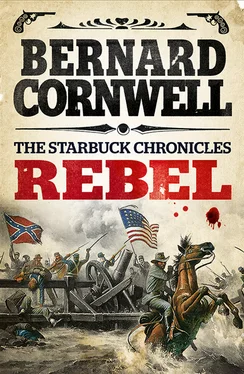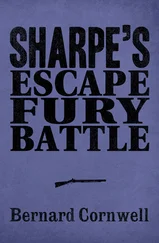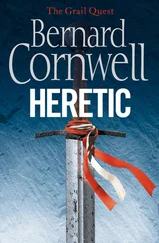The slavocracy, he told them, was doomed for the deepest pits of hell, to be cast down into the lake of burning sulfur where they would suffer the torments of indescribable pain for the length of all eternity. The Reverend Elial Starbuck had cut his preaching teeth on descriptions of hell and he offered a five-minute reprise of that place’s horrors, so filling his church with revulsion that some of the weaker brethren in the congregation seemed near to fainting. There was a section in the gallery where freed Southern slaves sat, all of them sponsored in some way by the church, and the freedmen echoed the reverend’s words, counterpointing and embroidering them so that the church seemed charged and filled with the Spirit.
And still the Reverend Elial racked the emotion higher and yet higher. He told his listeners how the slavocracy had been offered the hand of Northern friendship, and he flung out his own bruised hand as if to illustrate the sheer goodness of the offer. ‘It was offered freely! It was offered justly! It was offered righteously! It was offered lovingly!’ His hand stretched farther and farther out toward the congregation as he detailed the generosity of the Northern states. ‘And what did they do with our offer? What did they do? What did they do?’ The last repetition of the question had come in a high scream that locked the congregation into immobility. The Reverend Elial glared round the church, from the rich pews at the front to the poor benches at the back of the galleries, then down to his own family’s pew, where his eldest son, James, sat in his new stiff blue uniform. ‘What did they do?’ The Reverend Elial sawed the air as he answered his question. ‘They returned to their folly! “For as a dog returneth to his vomit, so a fool returneth to his folly.”’ That had been the Reverend Elial Starbuck’s text, taken from the eleventh verse of the twenty-sixth chapter of the Book of Proverbs. He shook his head sadly, drew his hand back, and repeated the awful word in a tone of resignation and puzzlement. ‘Vomit, vomit, vomit.’
The slavocracy, he said, was mired in its own vomit. They wallowed in it. They reveled in it. A Christian, the Reverend Elial Starbuck declared, had only one choice in these sad days. A Christian must armor himself with the shield of faith, weapon himself with the weapons of righteousness, and then march south to scour the land free of the Southern dogs that supped of their own vomit. And the members of the slavocracy are dogs, he emphasized to his listeners, and they must be whipped like dogs, scourged like dogs and made to whimper like dogs.
‘Hallelujah!’ a voice called from the gallery, while in the Starbuck pew, hard beneath the pulpit, James Starbuck felt a pulse of pious satisfaction that he would be going forth to do the Lord’s work in his country’s army, then he felt a balancing spurt of fear that perhaps the slavocracy would not take its whipping quite as meekly as a frightened dog. James Elial MacPhail Starbuck was twenty-five, yet his thinning black hair and perpetual expression of pained worry made him look ten years older. He was able to console himself for his balding scalp by the bushy thickness of his fine deep beard that well matched his corpulent, tall frame. In looks he took more after his mother’s side of the family than his father’s, though in his assiduity to business he was every bit Elial’s son for, even though he was only four years out of Harvard’s Dane Law School, James was already spoken of as a coming man in the Commonwealth of Massachusetts, and that fine reputation, added to his famous father’s entreaties, had earned him a place on the staff of General Irvin McDowell. This sermon would thus be the last James would hear from his father for many a week for, in the morning, he would take the cars for Washington to assume those new duties.
‘The South must be made to whimper like dogs supping their own vomit!’ The Reverend Elial began the summation which, in turn, would lead to the sermon’s fiery and emotive conclusion, but one worshiper did not wait for those closing pyrotechnics. Beneath the gallery at the very back of the church a box pew door clicked open and a young man slipped out. He tiptoed the few paces to the rear door, then edged through into the vestibule. The few people who noticed his going assumed he was feeling unwell, though in truth Adam Faulconer was not feeling physically sick, but heartsick. He paused on the street steps of the church and took a deep breath while behind him the voice of the preacher rose and fell, muffled now by the granite walls of the tall church.
Adam looked astonishingly like his father. He had the same broad shoulders, stocky build and resolute face, with the same fair hair, blue eyes, and square-cut beard. It was a dependable, trustworthy face, though at this moment it was also a very troubled face.
Adam had come to Boston after receiving a letter from his father that had described Starbuck’s arrival in Richmond. Washington Faulconer had sketched an outline of Nate’s troubles, then continued: ‘For your sake I shall offer him shelter and every kindness, and I assume he will stay here as long as he needs to, and I further assume that need might be for ever, but I surmise it is only the fear of his family that keeps him in Virginia. Perhaps, if you can spare the time from your endeavors,’ and Adam had smelt the rancor in his father’s choice of that word, ‘you might inform Nate’s family that their son is penitent, humiliated and dependent on charity, and so gain for him a token of their forgiveness?’
Adam had wanted to visit Boston. He knew the city was the most influential in the North, a place of learning and piety where he hoped to find men who could offer some hope of peace, but he had also hoped to discover some peace for Nate Starbuck to which end he had gone to the Reverend Elial Starbuck’s house, but the Reverend, apprised of Adam’s business, had refused to receive him. Now Adam had listened to his friend’s father preach and he suspected there was as little hope for America as there was for Nate. As the venom had poured from the pulpit Adam had understood that so long as such hatred went unassuaged there could be no compromise. The Christian Peace Commission had become irrelevant, for the churches of America could no more bring peace than a candle flame could melt the Wenham Lake in midwinter. America, Adam’s blessed land, must go to war. It made no sense to Adam, for he did not understand how decent men could ever think that war could adjudicate matters better than reason and goodwill, but dimly and reluctantly, Adam was beginning to understand that goodwill and reason were not the mainsprings of mankind, but instead that passion, love and hate were the squalid fuels that drove history blindly onward.
Adam walked the plump ordered streets of residential Boston, beneath the new-leafed trees and beside the tall clean houses that were so gaily decorated with patriotic flags and bunting. Even the carriages waiting to take the worshipers back to their comfortable homes sported American flags. Adam loved that flag, and could be made misty-eyed by all it stood for, yet now he recognized in its bright stars and broad stripes a tribal emblem being flaunted in hate, and he knew that everything he had worked for was about to be melted in the crucible. There was going to be war.
Thomas Truslow was a short, dark-haired stump of a man; a flint-faced, bitter-eyed creature whose skin was grimy with dirt and whose clothes were shiny with grease. His black hair was long and tangled like the thick beard that jutted pugnaciously from his dark-tanned face. His boots were thick-soled cowhide brogans, he wore a wide-brimmed hat, filthy Kentucky jeans and a homespun shirt with sleeves torn short enough to show the corded muscles of his upper arms. There was a heart tattooed on his right forearm with the odd word Emly written beneath it, and it took Starbuck a few seconds to realize that it was probably a misspelling of Emily.
Читать дальше












